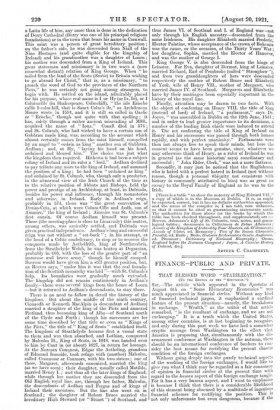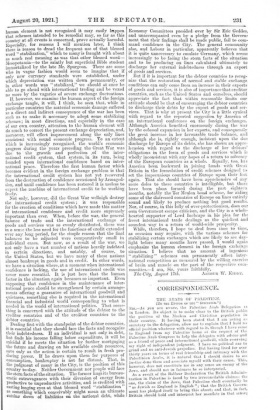FINANCE—PUBLIC AND PRIVATE.
THAT BLESSED WORD "STABILIZATION."
(To THE EDITOR OF THE "SPECTATOR.") SIR,—The article which appeared in the Spectator of August 6th on " Some Elementary Economics " was much appreciated in financial circles. Without any kind of financial technical jargon, it emphasized a cardinal feature of the present situation—namely, the breakdown in exchange. Wealth," as the writer of that article remarked, is the resultant of exchange, and we are not exchanging." It is a truth which the United States, among other countries, is at last beginning to recognize, and only during this past week we have had a somewhat cryptic message from Washington to the effect that America is proposing that, simultaneously with the dis- armament conference at Washington in the autumn, there should be an international conference of bankers to con- sider the best means for rectifying the present chaotic condition of the foreign exchanges. Without going deeply into the purely technical aspects of the working of the foreign exchanges, I would like to give you what I think may be regarded as a fair consensus of opinion in financial circles at the present time with regard to the human aspect of this foreign exchange tangle. For it has a very human aspect, and I want to emphasize it because I think that there is a considerable likelihood of this element being obscured by a multitude of ingenious financial schemes for rectifying the position. This is not only unfortunate but even dangerous, because if the human element is not recognized it may easily happen that schemes intended to be remedial may, so far as this country at all events is concerned, prove actually harmful. Especially, for reasons I will mention later, I think there is reason to dread the frequent use of that blessed word " stabilization," which to many is fraught with about as much real meaning as was that other blessed word- Mesopotamia—to the saintly but superficial Bible student immortalized by the late Mr. Spurgeon. There are some who in vague fashion would seem to imagine that if only new currency standards were established, under which depreciation was written down permanently, or in other words was " stabilized," we should at once be able to go ahead with international trading and be vexed no more by the vagaries of severe exchange fluctuations.
If, however, we examine the human aspect of the foreign exchange tangle, it will, I think, be seen that, while in particular countries the material economic damage suffered as a direct and indirect consequence of the war has been such as to make it necessary to adopt some stabilizing schemes ; in most directions, and especially in the case of our own country, attention to the human element will do much to correct the present exchange depreciation, and, moreover, will effect improvement along the only lines consistent with sound economic progress. To an extent which is increasingly recognized, the world's economic progress during the years preceding the Great War was due to the growth and perfection .of the inter- national credit system, that system, in its turn, being founded upon international confidence based on inter- national peace. Therefore the first human factor which becomes evident in the foreign exchange problem is that the international credit system has not yet recovered from the destruction of confidence occasioned by Armaged- don, and until confidence has been restored it is useless to expect the machine of international credit to be working freely.
Not only, however, did the Great War wellnigh destroy the international credit system ; it was responsible for the creation of conditions which have made this matter of international confidence and credit more supremely important than ever. When, before the war, the general balance of trade and the international exchange of goods and services was so evenly distributed, there was in a sense the less need for the functions of credit extended over any long period, for the simple reason that the final balances to be adjusted were comparatively small in individual cases. But now, as a result of the war, we not only have a vast number of nations heavily indebted in certain directions, and notably, of course, to the United States, but we have many of these nations almost bankrupt in goods and in credit. In other words, we have a situation where, at a moment when international confidence is lacking, the use of international credit was never more essential. It is just here that the human factor in the situation again becomes so important. Even supposing that confidence in the maintenance of inter- national peace should be strengthened by certain arrange- ments offering a guarantee of international goodwill and quietness, something else is required in the international financial and industrial world corresponding to what is needed in the world of international politics. That some- thing is concerned with the attitude of the debtor to the creditor countries and of the creditor countries to the debtor countries.
Dealing first with the standpoint of the debtor countries, it is essential that they should face the facts and recognize their indebtedness. If an individual is not only in debt, but finds his income falling below expenditure, it will be suicidal if he meets the situation by further mortgaging the future and drawing on his available credit resources, save only as the action is certain to result in fresh pro- ducing power. If he draws upon them for purposes of consumption, bankruptcy is not far distant. That, in the judgment of many in the City, is the position of this country to-day. Neither Government nor people will face the stern facts of the situation. The former hugs its bureau- cratic extravagances with their diversion of energy from productive to unproductive activities, and is credited with casting longing eyes at that blessed word "stabilization " as something which conceivably might mean an ultimate cutting down of liabilities on the national debt, while Economy Committees presided over by Sir Eric Geddes, and unaccompanied even by a pledge from the Govern- ment that their findings shall be made public, fail to com- mand confidence in the City. The general community also, and Labour in particular, apparently believes that it is quite unnecessary to emulate Germany, which seems increasingly to be facing the stern facts of the situation and to be producing on lines calculated ultimately to discharge her external indebtedness through an export of goods and services.
But if it is important for the debtor countries to recog- nize that the restoration of normal and stable exchange conditions can only come from an increase in their exports of goods and services, it is also of importance that creditor countries, such as the United States and ourselves, should appreciate the fact that within reasonable limits our attitude should be that of encouraging the debtor countries to discharge their debts by the export of goods and ser- vices. That is why at present the City is a little cynical with regard to the reported suggestion by America of an international conference on the foreign exchanges. Although America benefited enormously during the war by the colossal expansion in her exports, and consequently the great increase in her favourable trade balance, and although she is, rightly enough, insistent upon the due discharge by Europe of its debts, she has shown an appre- hension with regard to the discharge of her debtors' obligations in the form of goods and services which is wholly inconsistent with any hopes of a return to solvency of the European countries as a whole. Equally, too, has America been backward in joining hands with Great Britain in the formulation of credit schemes designed to set the impecunious countries of Europe upon their feet again. That she should have beCn apprehensive of any mere doles to these countries is intelligible, but there have been plans formed during the past eighteen months, notably the Ter Meulen bond scheme, for aiding some of the distressed countries of Europe on lines entirely sound and likely to produce nothing but good results. Nor, of course, in this folly of over-protectionism, does our own Government escape criticism, and the City is a whole- hearted supporter of Lord Inchcape in his plea for the freest international trade dealings as the quickest and soundest way to a return of world-wide prosperity.
While, therefore, I hope to deal from time to time, as occasion may require, with the various schemes for stabilizing certain exchanges which are likely to see day- light before many months have passed, I would again emphasize the human clement in the foreign exchange situation. I believe that no amount of ingenious " stabilizing " schemes can permanently affect inter- national competition as measured by the willing exercise of brain and muscle on the part of the respective coin- munitics.—I am, Sir, yours faithfully,



































 Previous page
Previous page